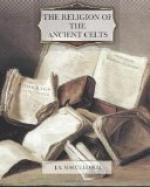In Irish sagas, rebirth is asserted only of divinities or heroes, and, probably because this belief was obnoxious to Christian scribes, while some MSS. tell of it in the case of certain heroic personages, in others these same heroes are said to have been born naturally. There is no textual evidence that it was attributed to ordinary mortals, and it is possible that, if classical observers did not misunderstand the Celtic doctrine of the future life, their references to rebirth may be based on mythical tales regarding gods or heroes. We shall study these tales as they are found in Irish texts.
In the mythological cycle, as has been seen, Etain, in insect form, fell into a cup of wine. She was swallowed by Etar, and in due time was reborn as a child, who was eventually married by Eochaid Airem, but recognized and carried off by her divine spouse Mider. Etain, however, had quite forgotten her former existence as a goddess.[1193]
In one version of Cuchulainn’s birth story Dechtire and her women fly away as birds, but are discovered at last by her brother Conchobar in a strange house, where Dechtire gives birth to a child, of whom the god Lug is apparently the father. In another version the birds are not Dechtire and her women, for she accompanies Conchobar as his charioteer. They arrive at the house, the mistress of which gives birth to a child, which Dechtire brings up. It dies, and on her return from the burial Dechtire swallows a small animal when drinking. Lug appears to her by night, and tells her that he was the child, and that now she was with child by him (i.e. he was the animal swallowed by her). When he was born he would be called Setanta, who was later named Cuchulainn. Cuchulainn, in this version, is thus a rebirth of Lug, as well as his father.[1194]
In the Tale of the Two Swineherds, Friuch and Rucht are herds of the gods Ochall and Bodb. They quarrel, and their fighting in various animal shapes is fully described. Finally they become two worms, which are swallowed by two cows; these then give birth to the Whitehorn and to the Black Bull of Cuailgne, the animals which were the cause of the Tain. The swineherds were probably themselves gods in the older versions of this tale.[1195]
Other stories relate the rebirth of heroes. Conchobar is variously said to be son of Nessa by her husband Cathbad, or by her lover Fachtna. But in the latter version an incident is found which points to a third account. Nessa brings Cathbad a draught from a river, but in it are two worms which he forces her to swallow. She gives birth to a son, in each of whose hands is a worm, and he is called Conchobar, after the name of the river into which he fell soon after his birth. The incident closes with the words, “It was from these worms that she became pregnant, say some."[1196] Possibly the divinity of the river had taken the form of the worms and was reborn as Conchobar. We may compare the story of the birth of Conall Cernach. His mother was childless, until a Druid sang spells over a well in which she bathed, and drank of its waters. With the draught she swallowed a worm, “and the worm was in the hand of the boy as he lay in his mother’s womb; and he pierced the hand and consumed it."[1197]




